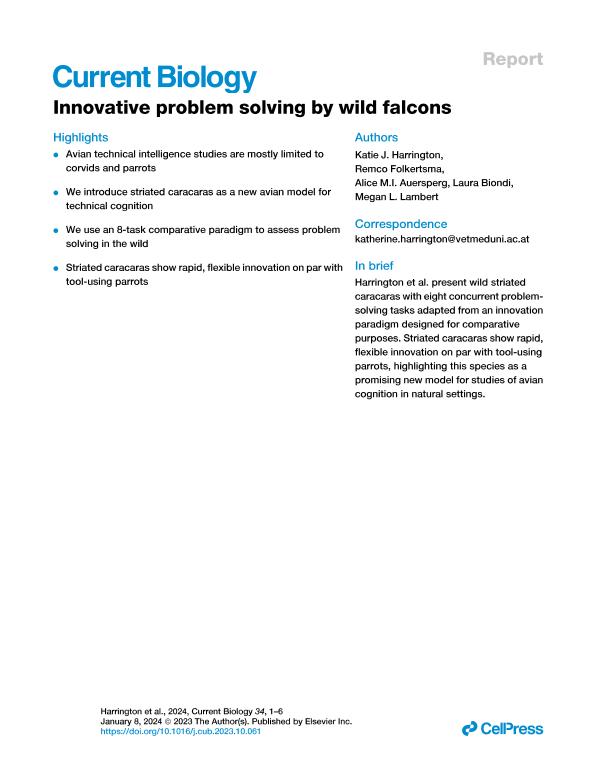Artículo
Innovative problem solving by wild falcons
Harrington, Katie J.; Folkertsma, Remco; Auersperg, Alice M. I.; Biondi, Laura Marina ; Lambert, Megan L.
; Lambert, Megan L.
 ; Lambert, Megan L.
; Lambert, Megan L.
Fecha de publicación:
01/2024
Editorial:
Cell Press
Revista:
Current Biology
ISSN:
0960-9822
Idioma:
Inglés
Tipo de recurso:
Artículo publicado
Clasificación temática:
Resumen
Innovation (i.e., a new solution to a familiar problem, or applying an existing behavior to a novel problem1,2) plays a fundamental role in species’ ecology and evolution. It can be a useful measure for cross-group comparisons of behavioral and cognitive flexibility and a proxy for general intelligence.3,4,5 Among birds, experimental studies of innovation (and cognition more generally) are largely from captive corvids and parrots,6,7,8,9,10,11,12 though we lack serious models for avian technical intelligence outside these taxa. Striated caracaras (Phalcoboenus australis) are Falconiformes, sister clade to parrots and passerines,13,14,15 and those endemic to the Falkland Islands (Malvinas) show curiosity and neophilia similar to notoriously neophilic kea parrots16,17 and face similar socio-ecological pressures to corvids and parrots.18,19 We tested wild striated caracaras as a new avian model for technical cognition and innovation using a field-applicable 8-task comparative paradigm (adapted from Rössler et al.20 and Auersperg et al.21). The setup allowed us to assess behavior, rate, and flexibility of problem solving over repeated exposure in a natural setting. Like other generalist species with low neophobia,21,22 we predicted caracaras to demonstrate a haptic approach to solving tasks, flexibly switching to new, unsolved problems and improving their performance over time. Striated caracaras performed comparably to tool-using parrots,20 nearly reaching ceiling levels of innovation in few trials, repeatedly and flexibly solving tasks, and rapidly learning. We attribute our findings to the birds’ ecology, including geographic restriction, resource unpredictability, and opportunistic generalism,23,24,25 and encourage future work investigating their cognitive abilities in the wild.
Archivos asociados
Licencia
Identificadores
Colecciones
Articulos(IIMYC)
Articulos de INSTITUTO DE INVESTIGACIONES MARINAS Y COSTERAS
Articulos de INSTITUTO DE INVESTIGACIONES MARINAS Y COSTERAS
Citación
Harrington, Katie J.; Folkertsma, Remco; Auersperg, Alice M. I.; Biondi, Laura Marina; Lambert, Megan L.; Innovative problem solving by wild falcons; Cell Press; Current Biology; 34; 1; 1-2024; 190-195
Compartir
Altmétricas



